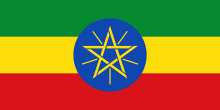User:Idw29807/Culture of Ethiopia
| This is the sandbox page where you will draft your initial Wikipedia contribution.
If you're starting a new article, you can develop it here until it's ready to go live. If you're working on improvements to an existing article, copy only one section at a time of the article to this sandbox to work on, and be sure to use an edit summary linking to the article you copied from. Do not copy over the entire article. You can find additional instructions here. Remember to save your work regularly using the "Publish page" button. (It just means 'save'; it will still be in the sandbox.) You can add bold formatting to your additions to differentiate them from existing content. |
https://www.adventure-life.com/africa/ethiopia/articles/glimpse-at-ethiopian-culture
https://www.iexplore.com/articles/travel-guides/africa/ethiopia/festivals-and-events
Valieva, Nafisa. “The Manuscript Book in the Traditional Culture of Ethiopia, Written by Platonov Vyačeslav Michajlovič, 2017.” Scrinium (Saint Petersburg, Russia), vol. 16, no. 1, 2020, pp. 410–12, https://doi.org/10.1163/18177565-00160A05.
https://sportsfoundation.org/most-popular-sports-in-ethiopia/
https://www.britannica.com/place/Ethiopia/Religion
cultures of Ethiopia
[edit]Ethiopian culture is diverse, vibrant, and deeply rooted in its ancient history. It encompasses a rich tapestry of languages, religions, cuisines, music, and traditions. From the ancient rock-hewn churches of Lalibela to the bustling markets of Addis Ababa, Ethiopia's cultural heritage is both fascinating and dynamic, reflecting the country's unique blend of African, Middle Eastern, and Christian influences.[1]
Ethiopian culture is characterized by its ancient Christian heritage, diverse languages spoken by over 80 ethnic groups, vibrant music and dance traditions, flavorful cuisine featuring injera and spicy stews, and colorful festivals celebrating religious and cultural events. With its rich history, stunning landscapes, and warm hospitality, Ethiopian culture continues to captivate and inspire people around the world.

Language and Literature
Ethiopia is home to over 80 ethnic groups, each with its own language and cultural traditions. Amharic is the official language, but other languages such as Oromo, Tigrinya, and Somali are also widely spoken. Ethiopian literature includes ancient religious texts, epic poems, and modern works of fiction and poetry. [2]
Holidays
Ethiopian holidays reflect its rich cultural and religious diversity. Some notable holidays include:

1.Timkat: Celebrates the baptism of Jesus in the Jordan River. It's marked with colorful processions, singing, and dancing.

2. Meskel: Commemorates the discovery of the True Cross by Empress Helena in the 4th century. It involves lighting a massive bonfire called "Damera" and singing and dancing around it.
3. Enkutatash: Ethiopian New Year, celebrated in September according to the Gregorian calendar. It's a time for feasting, gift-giving, and cultural celebrations.
4. Easter (Fasika): Celebrated with religious fervor, including fasting, attending church services, and feasting on traditional foods.

5. Id al-Fitr and Id al-Adha: Islamic holidays celebrated by Ethiopia's Muslim population, marking the end of Ramadan and the annual pilgrimage to Mecca, respectively. These holidays showcase Ethiopia's blend of Christian, Muslim, and indigenous traditions, making them vibrant and diverse celebrations throughout the year[3].
Sports
Ethiopians are globally renowned for their exceptional prowess in long-distance running, particularly in athletics. Here are some major descriptions about the sports Ethiopians are known for:
1. Marathon Running Dominance: Ethiopians have consistently dominated the marathon scene, producing world-class athletes who have triumphed in prestigious races like the Boston Marathon, New York City Marathon, and the Olympic Games. Legendary runners like Abebe Bikila, Haile Gebrselassie, and Kenenisa Bekele have solidified Ethiopia’s reputation as a powerhouse in marathon running.
2. 10,000-Meter Excellence: Ethiopian athletes have demonstrated remarkable success in the 10,000 meters event, consistently achieving podium finishes and breaking records in major international competitions, including the Olympics and World Championships.
3. Cross-Country Dominance: Ethiopia boasts a rich tradition of success in cross-country running, with its athletes frequently clinching individual and team titles at the World Cross Country Championships. The country’s challenging terrain and high-altitude training locations contribute to the development of elite cross-country runners.
4. Cultural Influence on Running: Running is deeply ingrained in Ethiopian culture, with long-distance running serving as a means of transportation, competition, and recreation for centuries. This cultural affinity for running, coupled with rigorous training regimens and natural talent, has propelled Ethiopians to the forefront of global athletics.[4]
Religion


Ethiopia is known for its diverse religious landscape, with Christianity and Islam being the two major faiths practiced in the country. Here's a brief description of Ethiopian religion. Christianity; Ethiopia is one of the oldest Christian nations in the world, with a significant portion of the population adhering to the Ethiopian Orthodox Tewahedo Church. This branch of Christianity has its own unique traditions and practices, including a liturgical language called Ge'ez and distinctive religious festivals. The Ethiopian Orthodox Church plays a central role in the country's culture and history, with religious observance deeply intertwined with daily life and secondly Islam; Islam is also widely practiced in Ethiopia, particularly in the eastern and southern regions of the country. Ethiopian Muslims follow the Sunni branch of Islam and have their own distinct traditions and customs. Mosques are important centers of worship and community life for Ethiopian Muslims, who observe Islamic festivals and rituals according to the lunar calendar.[5]
- ^ "USARiseUp Understanding Our Differences, Bridging Our Divisions And Celebrating Our Commonalities". SciVee. 2009-12-17. Retrieved 2024-03-21.
- ^ "Glimpse at Ethiopian Culture". www.adventure-life.com. Retrieved 2024-03-21.
- ^ "Ethiopia Holidays and Festivals". www.iexplore.com. Retrieved 2024-03-21.
- ^ "11 Most Popular Sports in Ethiopia". sportsfoundation.org. 2023-09-18. Retrieved 2024-03-21.
- ^ "Ethiopia - Christianity, Islam, Animism | Britannica". www.britannica.com. Retrieved 2024-03-21.
